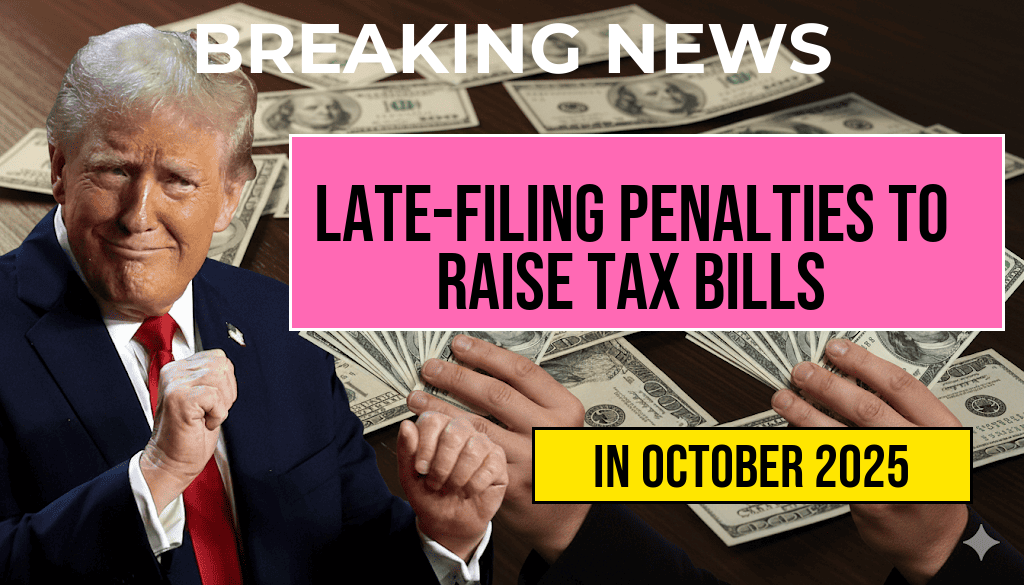As taxpayers prepare for the upcoming tax season, a significant change looms on the horizon: projected late-filing penalties are set to increase in 2026, potentially raising tax bills by hundreds of dollars. According to the IRS, the adjustments are part of a broader initiative to encourage timely filings and ensure compliance with federal tax regulations. The penalties are particularly impactful for those who may overlook deadlines or underestimate the importance of submitting their returns promptly. With the adjustments reflecting inflation and the increasing complexity of tax law, many taxpayers will need to be proactive in managing their obligations to avoid unexpected financial burdens.
The Details of the Increased Penalties
The IRS has announced that the current late-filing penalties will see a significant uptick, aligning more closely with inflation rates and the cost of living. Here’s a detailed breakdown:
- Current Penalties: Under the existing structure, the penalty for filing late is typically 5% of the unpaid tax for each month or part of a month that a return is late, not exceeding 25% of the unpaid tax.
- Projected Changes: Starting in 2026, the penalty will increase to 7% per month, significantly raising the maximum penalty to 35% of the unpaid tax.
- Inflation Adjustments: These changes are indexed to inflation, meaning future adjustments may occur as economic conditions shift.
Implications for Taxpayers
The increase in penalties could have far-reaching consequences for individuals and businesses alike. Taxpayers who miss the filing deadline could see their tax bills swell unexpectedly, potentially impacting their financial planning. Here are some implications to consider:
Financial Impact
For many, the increase in penalties could mean hundreds of dollars added to their tax bills. This could be particularly burdensome for low- and middle-income families who may already be feeling financial strain. The following table illustrates potential financial impacts based on different unpaid tax amounts:
| Unpaid Tax Amount | Current Penalty (2023) | Projected Penalty (2026) |
|---|---|---|
| $1,000 | $250 | $350 |
| $2,000 | $500 | $700 |
| $5,000 | $1,250 | $1,750 |
Encouraging Timely Filings
The IRS aims to reduce the number of late filers by creating a more stringent penalty structure. By increasing the cost of late filing, the agency hopes to encourage taxpayers to meet their obligations on time. This initiative is particularly relevant as compliance rates have historically shown fluctuations, with many taxpayers miscalculating the importance of timely submissions.
Advice for Taxpayers
As the tax landscape evolves, there are several strategies that taxpayers can adopt to avoid these heightened penalties:
- Stay Informed: Keep abreast of changes in tax law through reliable sources such as the IRS website or financial news outlets.
- Plan Ahead: Organize your documents and file your tax return well before the deadline to mitigate the risk of last-minute issues.
- Consult a Tax Professional: For those unsure about their tax obligations, seeking advice from a qualified tax professional can provide clarity and peace of mind.
More information about the changes can be found on the IRS website at irs.gov and financial insights from trusted sources like Forbes.
With the anticipated changes in late-filing penalties, taxpayers are encouraged to take proactive steps to ensure timely compliance, thereby avoiding the financial strain that could accompany these new regulations.
Frequently Asked Questions
What are the projected late-filing penalties for 2026?
The projected late-filing penalties for 2026 are expected to increase significantly, potentially adding hundreds of dollars to taxpayers’ bills. This increase is part of a broader change in tax regulations aimed at ensuring timely filings.
How will the increase in penalties affect taxpayers?
The increase in penalties means that taxpayers who fail to file their returns on time could face much higher financial consequences, resulting in an increase in their overall tax bills.
What steps can I take to avoid late-filing penalties?
To avoid late-filing penalties, taxpayers should ensure they file their tax returns on or before the deadline. Additionally, seeking assistance from tax professionals or using reliable tax software can help in meeting deadlines.
Are there any exceptions to the late-filing penalties?
Yes, there are certain exceptions where late-filing penalties may be waived, such as in cases of natural disasters or serious illness. Taxpayers may need to provide documentation to qualify for these exceptions.
When will the new penalties take effect?
The new penalties are set to take effect in 2026, so taxpayers should be aware of these changes and plan accordingly to avoid additional charges on their tax bills.








